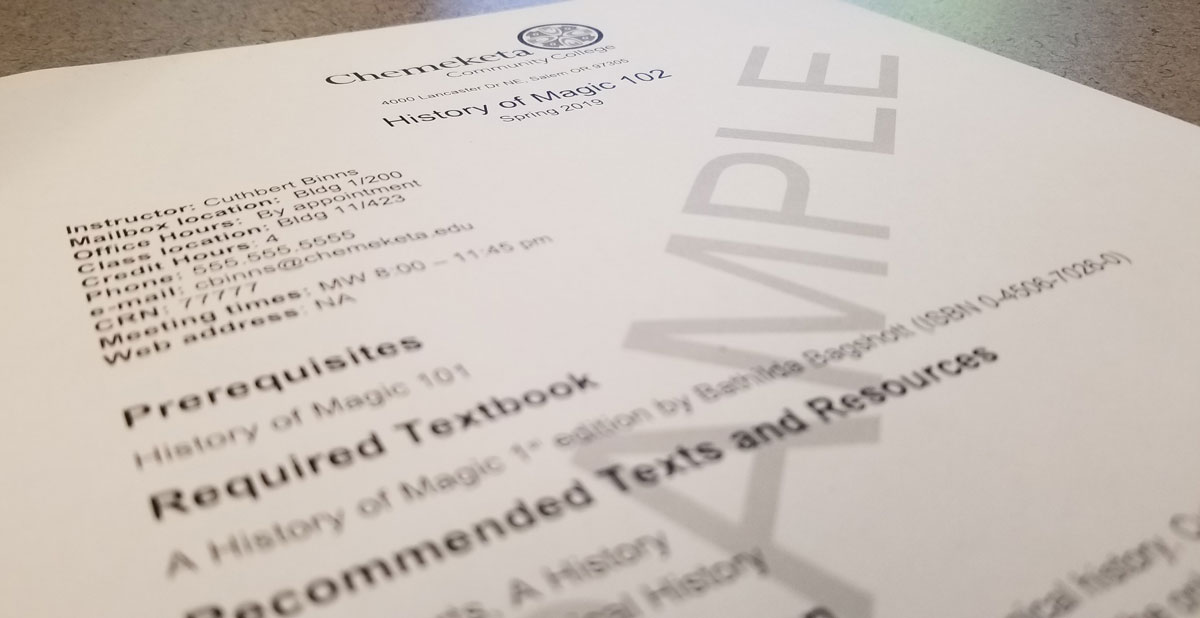Syllabus Resources
Syllabus Checklist
The syllabus checklist includes all of the items that are required in your syllabus, as well as recommended and optional items.

Academic Integrity Concerns – Generative AI (ChatGPT, BingChat)
We have updated the academic integrity syllabus statement to include additional information defining plagiarism as the unauthorized use of generative artificial intelligence. Please add this information to your syllabus.
Syllabus Statement
Academic honesty is an important building block of any learning community. Students and instructors demonstrate academic honesty when they participate truthfully, fairly, and respectfully. Being dishonest in your academic work not only interferes with your personal growth as a learner, it has a negative impact on your class community.
Chemeketa takes academic dishonesty seriously. If you are found in violation of Chemeketa’s academic honesty policy (POL 5020), you may be subject to the disciplinary process as reflected in Chemeketa’s academic honesty procedure (PRO 5020) and the Student Rights and Responsibilities. Violations of academic honesty include but are not limited to plagiarism, cheating, falsification, tampering, and getting inappropriate assistance. Violations also include using any form of generative artificial intelligence (such as text, image, or code generators like ChatGPT or Bing Chat) to complete your assignments or exams for this class, unless I specifically allow it.
[If the use of generative AI is permitted, then add:] “I will make clear any approved use of generative AI on assignment instructions” …and follow up by providing clear guidelines for which tools are permitted, how they may be used, and for what reason.
To learn more about academic honesty, visit the Academic Honesty webpage: https://www.chemeketa.edu/students/student-rights-responsibilities/academic-honesty/
Suggested, optional addendum:Two of the main reasons students choose to cheat are pressure to do well and feeling overwhelmed. If you are experiencing anxiety and are overwhelmed to a degree that you are tempted to cheat, please communicate with me, a counselor, or a tutor to get help.
Disclosure Statement for Recording Synchronous Instruction
Instructors who deliver any course with remote instruction and who record their remote class meetings need to include a disclosure statement alerting students to their right to not have their image, voice, questions or comments recorded in their syllabus.
Below is a sample disclosure statement to include in any syllabus for a course that will include recordings of remote class meetings:
I will be recording our class sessions and making the recording available on our course site on Canvas. This will be both an audio and a visual recording.
This means:
- if you participate with your video on or use a profile picture, you are agreeing to have your video and/or image recorded.
- if you participate by speaking, you are agreeing to have your voice recorded.
- if you participate by making comments in the chat feature, you are agreeing to have your name and comments recorded.
If you do not want your profile or video image recorded, turn off your video and remove your profile image. If you do not want your voice recorded, mute your microphone. If you do not want your name and comment(s) recorded, do not use the chat feature.
If you are unable to communicate with me during the class meeting due to your wish not to be recorded, please contact me to make other arrangements.
